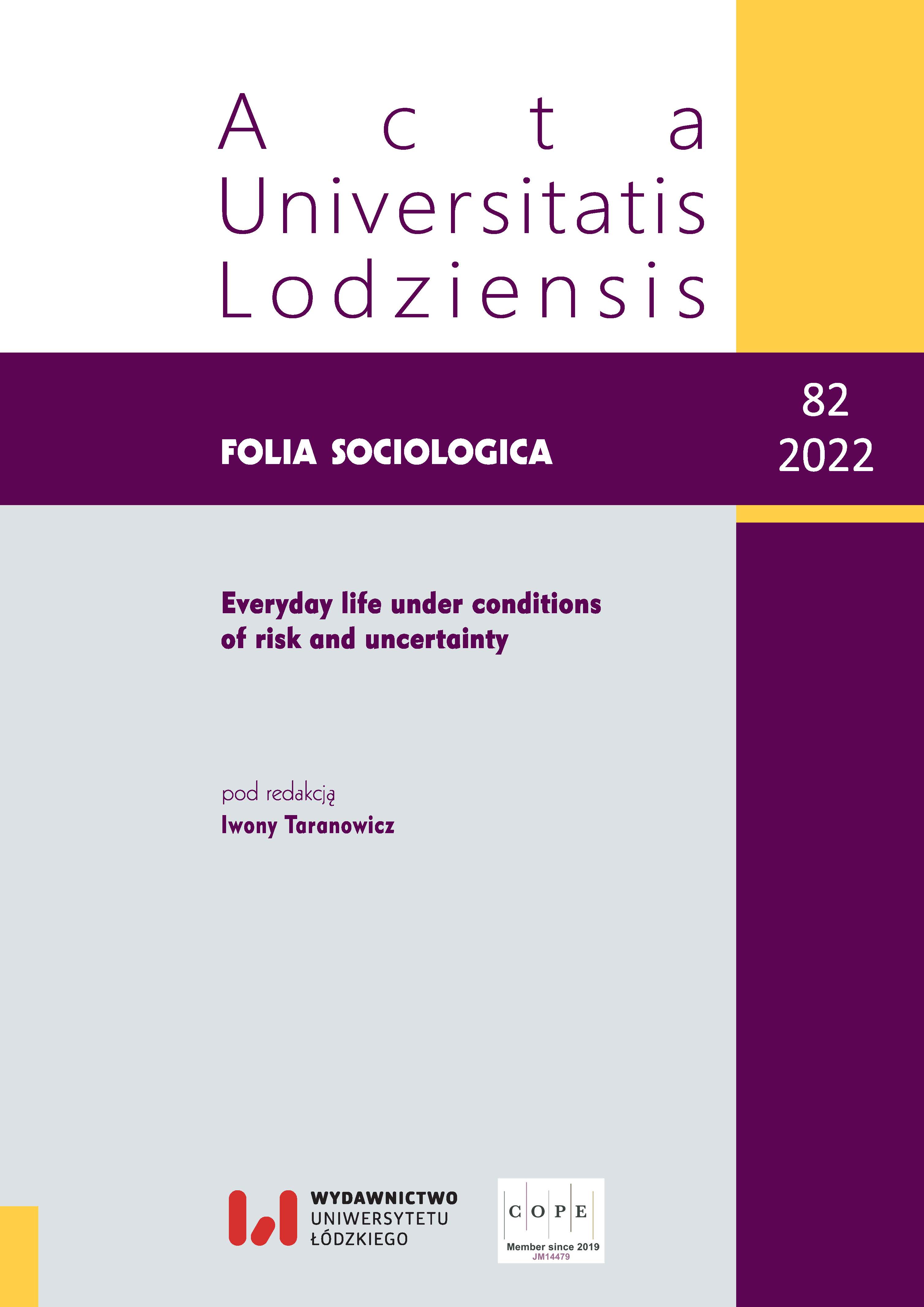Uncommon Daily Life/Daily Uncommonness. Everyday Life under Conditions of Risk and Uncertainty
DOI:
https://doi.org/10.18778/0208-600X.82.01Keywords:
everyday life, pandemic COVID-19, uncertainty, daily practicesAbstract
According to the proponents of the sociology of everyday life, the practices of everyday life maintain the order of social life. Berger and Luckmann argue that such practices are characterised by habitualness and unreflectiveness; they seem natural and self-evident, not requiring justification. However, their statement is no longer valid. It was not only the COVID-19 pandemic that violently disrupted the established order of everyday life. Even before the pandemic, processes of social change had occurred, and these processes shattered the unified vision of the world, the nomos in which all social practices found their justification. The sheer multiplicity of knowledge and belief systems that now exist, as legitimate as they are, forces individuals to be reflexive and to make choices from among different patterns of action. At the same time, new processes of change are constantly taking place that challenge the validity of previous choices. The COVID-19 pandemic did not start these processes, but it did exacerbate these processes. The question for researchers is how do individuals construct the order of their everyday life in these uncertain and risky conditions, an order whose constancy and predictability, as Giddens states, has always been a bulwark against fear and insecurity.
References
Beck U. (2002), Społeczeństwo ryzyka. W drodze do innej nowoczesności, transl. S. Cieśla, Wydawnictwo Naukowe Scholar, Warszawa.
Google Scholar
Berger P.L. (1997), Święty baldachim. Elementy socjologicznej teorii religii, transl. W. Kurdziel, Zakład Wydawniczy “Nomos”, Kraków.
Google Scholar
Berger P.L., Luckmann T. (1983), Społeczne tworzenie rzeczywistości. Traktat z socjologii wiedzy, Państwowy Instytut Wydawniczy, Warszawa.
Google Scholar
Centrum Badania Opinii Społecznej (CBOS) (2020), Ocena działań rządu w okresie epidemii, komunikat nr 55/2020.
Google Scholar
Centrum Badania Opinii Społecznej (CBOS) (2021), Obawy przed zakażeniem koronawirusem i ocena działań rządu w styczniu, komunikat nr 9/2021.
Google Scholar
Duncan S. (2011), Personal life, pragmatism and bricolage, “Sociological Research Online”, vol. 16(4), pp. 129–140 https://doi.org/10.5153/sro.2537
Google Scholar
DOI: https://doi.org/10.5153/sro.2537
Elias N. (2008), Społeczeństwo jednostek, transl. J. Stawiński, Wydawnictwo Naukowe PWN, Warszawa, pp. 110–166.
Google Scholar
Giddens A. (2001), Nowoczesność i tożsamość. “Ja” i społeczeństwo w epoce późnej nowoczesności, transl. A. Szulżycka, Wydawnictwo Naukowe PWN, Warszawa.
Google Scholar
Jacyno M. (2007), Kultura indywidualizmu, Wydawnictwo Naukowe PWN, Warszawa.
Google Scholar
Kaufmann J.-C. (2004), Ego, socjologia jednostki. Inna wizja człowieka i konstrukcji podmiotu, transl. K. Wakar, Oficyna Naukowa, Warszawa.
Google Scholar
Maffesoli M. (2008), Czas plemion. Schyłek indywidualizmu w społeczeństwach ponowoczesnych, transl. M. Bucholc, Wydawnictwo Naukowe PWN, Warszawa.
Google Scholar
Malaquias S., Crespo C., Francisco R. (2015), How do adolescents benefit from family rituals? Links to social connectedness, depression and anxiety, “Journal of Child and Family Studies”, vol. 24(10), pp. 3009‒3017.
Google Scholar
DOI: https://doi.org/10.1007/s10826-014-0104-4
Rosa H. (2020), Przyspieszenie, wyobcowanie, rezonans. Projekt krytycznej teorii późnonowoczesnej czasowości, transl. J. Duraj, J. Kołtan, Europejskie Centrum Solidarności, Gdańsk.
Google Scholar
Schuck L.A., Bucky J.E. (1997), Family rituals: Implications for early intervention, “Topics in Early Childhood Special Education”, vol. 17(4), pp. 477‒493.
Google Scholar
DOI: https://doi.org/10.1177/027112149701700407
Schütz A. (2008), O wielości światów. Szkice z socjologii fenomenologicznej, Zakład Wydawniczy “Nomos”, Kraków.
Google Scholar
Schütze F. (1997), Trajektorie cierpienia jako przedmiot badań socjologii interpretatywnej, “Studia Socjologiczne”, vol. 1(144), pp. 11–56.
Google Scholar
Southerton D. (2013), Habits, routines and temporalities of consumption: From individual behaviours to the reproduction of everyday practices, “Time & Society”, vol. 22(3), pp. 335–355 https://doi.org/10.1177/0961463X12464228
Google Scholar
DOI: https://doi.org/10.1177/0961463X12464228
Spagnola M., Fiese B.H. (2007), Family Routines and Rituals A Context for Development in the Lives of Young Children, “Infants & Young Children”, vol. 20, no. 4, pp. 284–299 https://doi.org/10.1097/01.IYC.0000290352.32170.5a
Google Scholar
DOI: https://doi.org/10.1097/01.IYC.0000290352.32170.5a
Sulima R. (2011), Moda na codzienność. Kategoria “codzienności” w kulturze ponowoczesnej, “Kultura Współczesna”, no. 4.
Google Scholar
Szacki J. (2002), Historia myśli socjologicznej, Wydawnictwo Naukowe PWN, Warszawa, pp. 842–844.
Google Scholar
Sztompka P. (2008), Życie codzienne – temat najnowszej socjologii, [in:] P. Sztompka, M. Bogunia-Borowska (red.), Socjologia codzienności, Wydawnictwo Znak, Kraków.
Google Scholar
Wright-St Clair V., Hocking C., Bunrayong W., Vittayakorn S., Rattakorn P. (2005), Older New Zealand women doing the work of Christmas: a recipe for identity formation, “The Sociological Review”, vol. 53(2), pp. 332–350 https://doi.org/10.1111/j.1467-954X.2005.00517.x
Google Scholar
DOI: https://doi.org/10.1111/j.1467-954X.2005.00517.x
Published
How to Cite
Issue
Section
License

This work is licensed under a Creative Commons Attribution-NonCommercial-NoDerivatives 4.0 International License.










